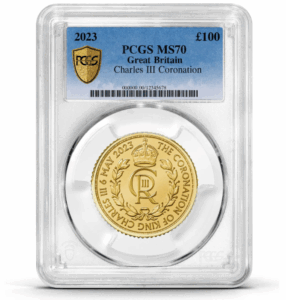Before purchasing gold coins there are many things to consider. Primarily, you need an option that aligns with your investment profile. As part of this, you will choose between buying a certified coin or a ‘loose’ coin.
But what does this mean? Read on to discover the differences between the two and to help you understand which is the right option for you.
Gold Coins in General
The value of gold coins differs from that of gold bars. With the latter, the value is almost always roughly the melt value which is the intrinsic value of its gold content, calculated based on its weight, purity, and the current market price – minus any transaction fees. Gold coins also have this melt value but have an additional value, and that’s collector value. A gold coin, in good condition, which is rare can be worth many multiples of its melt value in the collector market. Collector demand is independent of the spot price of gold as a commodity.
Certified Gold Coins in Focus – The Sheldon Scale
The Sheldon Scale is a 70-point grading system used for certifying gold coins. It determines the authenticity and condition of a coin and ranges from 1 (poor) to 70 (perfect mint state). A coin graded as P-1 would be in the worst condition whilst an MS70 would be the ‘perfect coin’ (the ‘P’ prefix meaning poor and the MS prefix meaning ‘Mint State.’ An MS70 is the pinnacle and a coin graded as such will have no visible flaws, scratches, contact marks or signs of handling when viewed under 5x magnification. It will also exhibit a sharp, complete strike with all design details fully defined and perfect lustre (shine/reflective quality).
Professional Coin Grading Service
Solomon Global uses the Professional Coin Grading Service (PCGS) for certifying the coins we offer as it is one of the most eminent and respected coin grading services in the industry. Our curated selection of MS70 Certified coins includes the PCGS Certified 2021 Britannia 1oz Gold Coin, the PCGS Certified 2025 Tudor Beast Queen’s Panther 1oz Gold Coin and the above PCGS Certified 2023 Coronation of His Majesty King Charles III 1oz Gold Coin. These are contained within a clear plastic casing and are known as ‘slabbed coins.’

What Buying a Certified Coin Means
A PCGS certification gives collectors and investors confidence in the coin’s authenticity and condition. Coins carrying this certification tend to command a premium – meaning increased profit potential – and are easier to sell. Certified coins are encased in a secure, tamper-proof holder, which guards against counterfeiting and offers protection from air, moisture and handling; all things which can degrade a coin and affect its value. A top-tier grade can dramatically boost the value of rare or higher-demand coins.
There are many benefits to getting a coin certified. However, potential investors need to factor in the costs of doing this and understand that it will take longer to realise potential profits. With this in mind, Solomon Global recommends certified coins as a longer-term investment strategy and to hold for at least five years.
What are Loose Coins?
With so-called loose coins, you aren’t paying the premium for certification and slabbing so they usually have a lower initial purchase price. However, they don’t benefit from the added layers of value that certified coins have. Because of this, they can sell for less due to the uncertainty surrounding their condition, grade and authenticity. That said, you can get good quality undervalued loose coins and later have them certified/graded. Loose coins can be easier to trade informally and can provide greater flexibility in terms of investment time horizon.
Are loose coins or certified coins the best choice?
The primary factors to consider when choosing between certified and loose coins are budget, investment time horizon, investment objective, market trends and storage. As always, Solomon Global can discuss your requirements and provide practical solutions tailored to your needs.
Check out our glossary for explanations on more gold and precious metals terminology.
Disclaimer: This blog is for informational purposes only and does not constitute financial advice. Buying physical gold as an investment involves risk, as the value of precious metal prices can be volatile. Historical financial performance does not necessarily give a guide of future financial performance. We recommend that you conduct your own independent research and seek professional tax, legal and financial advice before making any investment decisions.



